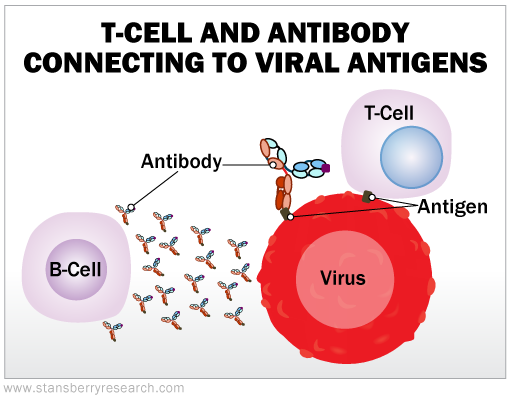Two years into the pandemic and COVID-19 cases are rising again... thanks to the Omicron variant.
And with rising cases comes more vaccinations. One of my researchers spoke with a pharmacist before Christmas who explained that they've been overwhelmed with folks getting COVID-19 vaccines. According to the pharmacist, he's seen more people coming in for their first jab and appointments can fill up within minutes.
If you're one of these folks, there's an incredibly simple way to nearly guarantee your immune system makes the most of it... and produces a near-perfect defense against the viruses.
It turns out sleep has a very close relationship with the immune system. When we sleep, our immune system (within our bone marrow) produces and releases young and naive T-cells (a type of white blood cell) that make their way to mature in the little organ that is just below our breastbone, called the thymus. These kindergartener-like T-cells get "educated" there to patrol, attack, and manage foreign substances in the body, especially viruses.
While we sleep, our bodies also create immune modulating proteins, called cytokines, which also regulate our immune responses when our body is under attack.
When you receive a vaccine, your immune system sees these foreigners and learns the parts of the virus that are antigens. The T-cells then become activated once they bind to a specific antigen. Once it's attached, the T-cell will receive instructions from the cytokines regarding how to respond to the threat.
Cytokines assist in the process and help the education and recognition process. Feedback from these and other cells tells the body it is under attack which further stimulates the production of more blood cell types in the body. These cytokines also help mobilize white blood cells toward the sites of infection.
There's another "branch" of the immune system that gets trained, called the B-cell system. These cells create "fork" or "Y" shaped proteins called antibodies in response to a specific threat – often a virus, but bacteria and allergens as well. Antibodies attach themselves to similar parts of the intruder. These attachment parts are called antigens, and trigger an immune response to occur...

Studies have shown that not getting enough sleep before and after a vaccination will negatively affect your immune response.
A 2003 study found that participants who had a regular night of sleep following a hepatitis-A vaccination contained twice as many hepatitis-A antibodies four weeks later, compared with those who were directed to stay awake on the night following the vaccine.
To get the most out of your vaccine or booster, getting both good quality and a good quantity of sleep is critical...
Turns out, there is even a group of researchers who are calling for the use of melatonin – a hormone that promotes sleep – to be administered in the two weeks leading up to a vaccination. The thought is that people can then achieve their optimal sleep by the time they get the vaccination.
Good quality sleep has the following characteristics:
- You fall asleep within 30 minutes of lying down.
- You sleep soundly through the night, awakening only once if at all.
- You drift back to sleep in 20 minutes or less if you do happen to wake up.
Good quality sleep is restorative and allows you to wake up feeling refreshed and in a good mood.
A good quantity of sleep for adults ranges from seven to nine hours of sleep each night. Everyone is a little bit different regarding exactly how much sleep is enough, but the bottom line is... if you wake up feeling alert, then you've gotten enough sleep.
So before and after your vaccination or booster, prioritize your sleep. Also, follow some of my tips for a good night's sleep... like keeping your room dark and cool, and not eating at least two hours before bed. You can read more about that here: Five Tips for a Better Night's Sleep.
What We're Reading...
- The ideal sleep number isn't eight.
- Something different: The New Year once started in March.
Here's to our health, wealth, and a great retirement,
Dr. David Eifrig and the Health & Wealth Bulletin Research Team
January 4, 2022
